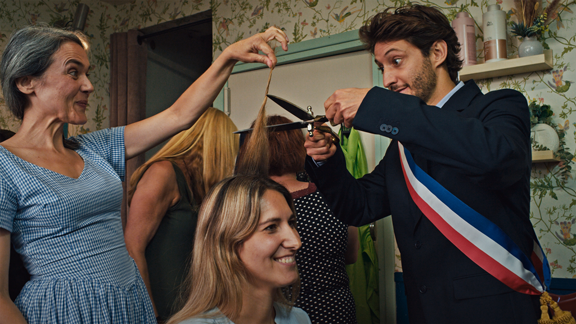There’s always something irresistible about films that explore creative minds. From Amadeus to Shakespeare in Love, we are obsessed with trying to understand how artists work and where their ideas come from. Perhaps this is with the faint hope that whatever magic they were able to find might happen to rub off on us.
The Book of Solutions (2023), a French dramedy directed by Michel Gondry, is a film about making a film. It delves into the anatomy of the creative mind, from the highs of an inspiration “flow” to the depths of rejection and inadequacy.
The film’s protagonist, Marc (Pierre Niney), is a director. He becomes the clichéd embodiment of the struggling artist after his latest film is dropped by a Parisian production company. Hoping to find inspiration for a new film, Marc escapes to a quaint Cévennes village to stay with his aunt Denise (Francoise Lebrun) and spend time with his editing crew, Charlotte (Blanche Gardin) and Sylvia (Frankie Wallach). But, while this change of scenery unleashes a tidal wave of ideas, Marc inches closer towards madness.
Gondry captures Marc’s chaotic mental state in a style that is fittingly disordered. Over the course of the film, he builds a pastiche of mismatched scenes that span several genres. For instance, an elegant montage of the Cévennes region is placed beside a stop-motion animation sequence about a talking fox.
Later in the film, an action-packed shoot-out scene reminiscent of a James Bond movie is interrupted by a cooking video where Denise lovingly instructs us how to make grattin aux pates. While these rapid shifts in style prevent the film from achieving a sense of unity, they do allow us to step-inside Marc’s disjointed mind, even if this does leave us baffled at times.
Marc’s “masterpiece”, a treatise on creativity called ‘The Book of Solutions’, becomes a motif that guides us through this lack of unity. Marc reads excerpts from his book through a series of recurring voiceovers. Among his long digressions on the nature of creativity, his main ‘rules’ include “Learn by doing” and “Don’t listen to others.”
While these rules are insightful, the voiceovers become too introspective. We spend more time inside Marc’s mind than we initially bargained for and the film itself begins to drag.
Gondry seems to switch between parodying Marc’s narcissism and sympathising with his self-doubt. In one memorable scene, Marc wants to record a score for his new film. He hires an entire orchestra but decides to fire the conductor and direct the musicians himself, despite having no musical experience. Gondry celebrates Marc’s courage here – the rule “Learn by doing” is flashed across the screen — and seems to overlook his sheer arrogance, which becomes increasingly off-putting.
Despite pushing forty, Marc is still a child at heart. Although Gondry seems to romanticise this fact — he uses a whimsical piano motif by Étienne Charry to suggest a quaint kind of innocence — I quickly became irritated by Marc’s man-child behaviours, especially his treatment towards his female crew.
Marc frequently abuses Charlotte and Sylvia, throwing temper tantrums when things don’t go his way. In one instance, he becomes so angry he throws a pile of plates down the stairs. But Gondry frames these outbursts as the inevitable consequence of creativity. He does not want us to criticise Marc’s actions, but sympathise with the difficulties he endures as an artist.
While Gondry has effectively portrayed the creative mind at work, the film becomes less about its initial themes of creativity and the complexity of finding inspiration, and more focused on the delicate male ego.
Ultimately, there is only so much of Marc’s self-indulgent introspection we can take. It is a shame Gondry failed to realise just how irritating his protagonist really is.
The Book of Solutions (2023) played at the 2024 Alliance Française French Film Festival.





